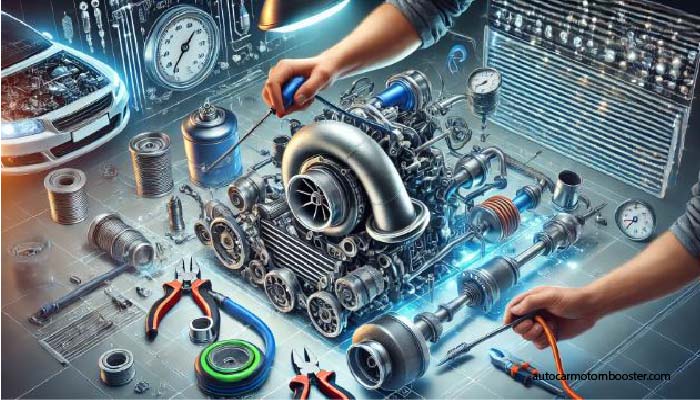In a turbocharged engine, maintaining the boost system is crucial for optimal performance and fuel efficiency. A neglected system can lead to power loss, increased emissions, and expensive repairs. Thankfully, regular DIY maintenance can help you keep your boost system running smoothly without needing professional intervention. This guide explores practical DIY checks to enhance your vehicle’s performance.
Understanding the Boost System
Before diving into the DIY checks, it’s essential to understand the components of a boost system. A typical system includes:
- Turbocharger or supercharger
- Intercooler
- Vacuum lines and hoses
- Boost control valve
- Sensors and actuators
Each part works together to ensure your engine gets the right air-to-fuel ratio for enhanced performance.
DIY Steps to Maintain Your Boost System
Here’s a step-by-step guide to maintaining your boost system efficiently:
1. Inspect All Hoses and Connections
Over time, hoses and connections can become worn out or develop cracks. Regularly inspect for:
- Visible cracks or leaks
- Loose clamps or fittings
- Signs of oil buildup, which may indicate a leak
Tighten loose clamps and replace any damaged hoses to prevent boost leaks.
2. Check for Boost Leaks
A boost leak reduces engine performance and increases fuel consumption. Here’s how to check:
- Use a boost leak tester with compressed air.
- Pressurize the system and listen for hissing sounds.
- Apply soapy water to suspected areas; bubbles will confirm a leak.
Fix any leaks promptly to maintain optimal boost pressure.
3. Clean the Intercooler
The intercooler cools compressed air before it enters the engine, improving efficiency. Over time, dirt and debris can clog it. To clean:
- Remove the intercooler carefully.
- Use a degreaser to clean the internal and external surfaces.
- Ensure it’s completely dry before reinstalling.
A clean intercooler boosts airflow and engine performance.
4. Test the Boost Control Valve
The boost control valve regulates pressure in the system. A malfunction can lead to power loss or turbo overboosting. Here’s how to test:
- Disconnect the valve and inspect for blockages or wear.
- Use a multimeter to check electrical connectivity.
- Replace it if it doesn’t meet the recommended specifications.
5. Monitor Sensor Readings
Modern boost systems rely on sensors for accurate performance. Common sensors include:
- MAP (Manifold Absolute Pressure) sensor
- MAF (Mass Air Flow) sensor
Use a diagnostic tool to monitor sensor readings. Incorrect data can lead to engine misfires or poor fuel efficiency.
Benefits of Maintaining Your Boost System
Taking care of your boost system has numerous advantages:
- Improved engine performance
- Reduced fuel consumption
- Prolonged turbocharger lifespan
- Lower emissions
- Cost savings on repairs
Common Mistakes to Avoid
While DIY maintenance is cost-effective, there are pitfalls to avoid:
- Skipping regular checks: Neglecting inspections can lead to undetected issues.
- Using incorrect tools: Always use specialized tools like a boost leak tester.
- Ignoring warning signs: Don’t overlook unusual noises, loss of power, or increased smoke.
Conclusion
By following these DIY checks, you can ensure your boost system remains efficient and reliable. Regular maintenance not only saves money but also enhances your vehicle’s performance and longevity. Start inspecting your boost system today and enjoy a smoother ride.
FAQs
1. How often should I check my boost system?
You should inspect your boost system every three months or after driving in harsh conditions.
2. Can I fix a boost leak myself?
Yes, you can. Using a boost leak tester, identify the leak and replace damaged hoses or fittings.
3. How do I know if my boost system is malfunctioning?
Signs include loss of power, hissing sounds, excessive smoke, and reduced fuel efficiency.
4. Do I need special tools for DIY boost system checks?
Basic tools include a boost leak tester, multimeter, and cleaning supplies like a degreaser.
5. Can a dirty intercooler affect performance?
Yes, a clogged intercooler restricts airflow, leading to reduced engine efficiency and higher emissions.
If Like This Article Visit Our Website. Collect From Wekiapedia
